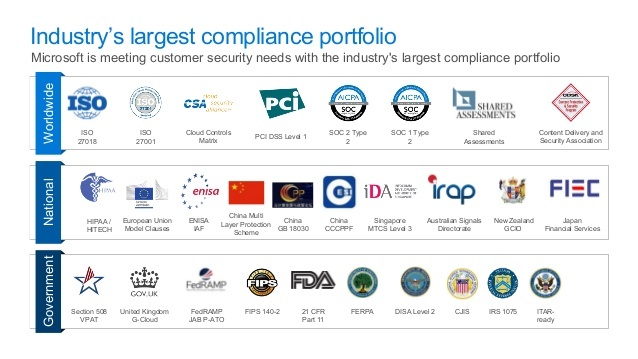In a data-driven world, data breaches happen, and managing industry compliance and data security is a complex task for an organization to navigate on its own. Compliance is even more of a challenge for regulated industries such as healthcare, legal, or financial services – where extensive, constantly evolving regulations make it difficult to stay up-to-date.
One of the biggest benefits of leveraging public cloud computing is that many of the regulatory and data protection standards can be handed off to, or at least shared with, the cloud vendor. This blog will discuss how Microsoft Azure, specifically, can help you ensure the highest level of trust, transparency, and data security.
How Microsoft Azure complies with international, regional, and industry standard
Of all cloud providers, Microsoft Azure offers the most comprehensive set of compliance and industry standards for different sectors, including the highly regulated sectors of healthcare, manufacturing, education, financial services, and government. For cross-border businesses and transactions there are even more regulations to comply with, and Azure has built-in compliance for many of these as well.
Below are the examples of some established standards Microsoft Azure cloud services are in compliance with.
|
Global |
Regional or National |
Industry/Sector Specific |
|
|
|
How you can manage data security and compliance
Compliance is more complicated than just meeting a checklist of standards and regulations. Effective compliance requires a two-way partnership between the customer who owns the data (your company) and the cloud vendor who acts as the data processor and delivery platform. Having a partnership agreement that defines roles and responsibilities is essential to achieve complete legal and regulatory compliance.
Microsoft Azure offers an easy way for legal and compliance professionals inside organizations to gain access to tools and information to help customers’ staff operate in a consistent and compliant way. This includes access to governance, risk and compliance summaries, as well as tools for managing employee security access settings, device management policies, data retention policies, and eDiscovery.
The cloud provider provides the tools, but you are responsible for operating a compliant cloud environment once the service has been provisioned. You must identify which controls apply to your business, and understand how to implement and configure them to manage security and compliance with applicable regulatory requirements.
Legal staff in your company can also use the audited reports, compliance certifications and attestations provided by Microsoft Azure to as proof of compliance for your customers to demonstrate how you deal with industry compliance requirements.
You can trust the Microsoft Azure cloud
In addition to the most comprehensive compliance offerings, Microsoft has more than 1,400 lawyers and public policy professionals working with legal and compliance leaders to tackle the regulatory issues businesses face in more than 100 countries (Think Cloud Compliance, Microsoft). Therefore, even in the ever-changing regulatory landscape, you can have complete confidence trusting the security and privacy of their applications and data in Microsoft Azure.
By leveraging the compliance offerings of Microsoft Azure cloud solutions you can help your organization and your customers realize the following tangible benefits:
- More protection against data leaks and breaches;
- Less risk of regulatory or legal sanctions;
- Lower costs for achieving compliance;
- Assurance of adherence to international privacy and security standards;
- Assurance of adherence to the rules of highly regulated industries;
- Decreased overall risk for data and business
Tags: Microsoft Azure


